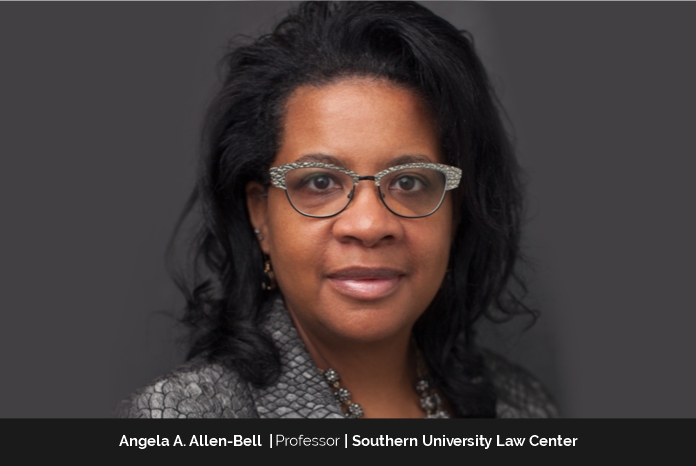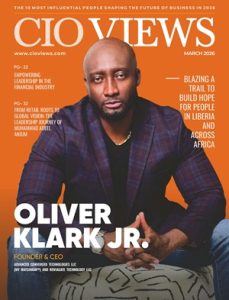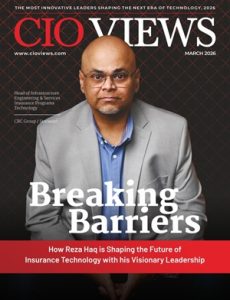Angela A. Allen-Bell, Esq. is a graduate of the Southern University Law Center in Baton Rouge, Louisiana. She holds the B. K. Agnihotri Endowed Professorship and is currently a full professor at Southern University Law Center (SULC).
Angela is a respected local, national and international legal scholar and expert on constitutional law; criminal procedure; civil and human rights; social, restorative and transitional justice; and, the interplay between race and justice. She has adopted a particular brand of lawyering that places restorative justice and transitional justice (TJ) at the center of her work.
It was her research that catapulted the movement that successfully ended the use of non-unanimous juries in Louisiana in 2018. And she is one of the founding members of the advocacy team that led this effort to reform Louisiana’s jury system through the adoption of legislation requiring unanimous juries in criminal trials in Louisiana state courts. She has the distinction of having worked on several other historic advocacy campaigns, such as the 50th Commemoration of Students United and the 1972 Southern University student movement, the Angola 3 case, Soledad Brother John Clutchette’s case, Vincent Simmons’ case and the case of Robert Holbrook.
When, in January 2022, Louisiana Governor John Bel Edwards issued a posthumous pardon to Homer Plessy, Professor Bell was selected to speak as the historian for the occasion. The House of Representatives of the Legislature of Louisiana has commended her “for her achievements as a legal scholar” and has recognized and recorded “the tremendous pride and honor that she rings” to the state of Louisiana.
Angela is a member of the National Black Lawyers-Top 100 and The Fellows of the American Bar Foundation, two invitation-only societies. In 2022, she was selected, through a national search, as a member of the first cohort of the Culture of Health Leadership Institute for Racial Healing, as well as a Louisiana Leading Lady. In 2019, the Girl Scouts Louisiana East recognized her as a Woman of Distinction, and she received the National Civil Rights Conference Civil Rights and Social Justice Award. Her signature trait is a never-ceasing desire to eradicate racial hierarchies and to dismantle systems of oppression.
Angela has made many media appearances and participated in many local, national, and international collaborations to discuss her scholarship and advocacy work, including many media appearances and participated in many local, national and international collaborations to discuss her scholarship and advocacy work, including La Presse (France), Le Nouvel Observateur (France), MSNBC (News Nation with Tamron Hall), CBS News, NBC Nightly News and National Public Radio (All Things Considered). She has twice submitted written testimony to the United States Senate’s Judiciary Committee on the Constitution and she has been published in or quoted in a range of print media sources, such as the Washington Post, Capital B News, Law 360, Russia Today TV, the New Yorker, the Huffington Post and the Advocate.
Some academics feel providing instruction to students is their primary function. Professor Bell doesn’t challenge anyone for holding that view, but it is not shared. “I am what many call an activist scholar. Those of us who identify as such feel called to extend our expertise beyond the walls of academic institutions. We engage in research that is relevant to current social problems and we attempt to use our credentialing and expertise to facilitate change. My scholarship agenda propels me to do the social, restorative and transitional justice work I do. It also inspires further study by other academics and can cause policy and law changes,” she explains.
As such, Angela has worked on many unique and inspiring cases throughout her professional career. These cases have brought overdue justice to individuals and have led to important legal and policy reforms. One ongoing effort is a collaboration with the people of England and Wales. In May 2024, she travelled to the City Law School in London to share her research and support of their efforts to end non-unanimous juries. Her compelling body of work has been well documented and preserved online.
Southern University Law Center (SULC)
SULC is a mission-driven law school that is part of the Historically Black Southern University System. SULC opened in 1947 because the state of Louisiana refused to admit Black students to segregated, state institutions. SULC’s HBCU status shouldn’t be misunderstood. The institution is not all-Black. Great diversity exists amongst faculty and students.
“I attended law school at SULC. I was an adjunct there for five years. I have been a full-time professor for sixteen years,” says Angela.
Angela is a tenured member of the law faculty at SULC. Her professional duties at the law school involve teaching, service and scholarship. Most of her “work” in the vineyards of justice is done because of a higher calling; it is a form of ministry.
Professor Angela A. Allen-Bell’s inspiration to join the legal profession
Angela’s decision is not the result of one thing. There are three forces that collided and sent her in the direction of law.
While growing up in New Orleans, she lived a middle-class lifestyle, but was keenly aware of the fact that that was not the case for everyone in the city. Poverty in the city was very high and it was often generational. “I recall being aware of it and I recall being bothered by the way it could limit a person’s life opportunities. This partly influenced my gravitation to law. I saw it as a way to protect the marginalized,” she states.
The second reason Angela pursued a career in law was because of her grandmothers, both of whom were domestic workers (much like the ladies depicted in “The Help”). Angela first realized, as an adult, that they did what they could and not what they wanted for a living. She never realized during her childhood that the world was marginalizing Black women in terms of career options. They never manifested any anger about this. They adapt to the space they were given. Despite this, they found a way to make work a source of pride and honor. “It is because of these two ladies that I am unwilling to wear shackles of any sort. Living my calling is a form of homage I pay to them. They couldn’t; so, I must,” she explains.
Angela’s final reason involves two women who deeply impacted her in her formative years. She didn’t have many role models growing up. In reflection, she thinks that had a lot to do with her being raised in an environment that emphasized shortcomings more than positive attributes. “I think this aborted my dreams and robbed me of the ability to see myself as capable of accomplishing great things. Two women entered my life and disrupted this pathology,” Angela states.
The late Oretha Castle Haley was the first. Angela met her when she was around sixteen. She was directing a program Angela was enrolled in that summer. She entered the room, said nothing, but impacted the audience in the way a sonic boom would. Her eyes were piercing. Her words, though gently spoken, commanded a collective reverence. “I had never been in the presence of such a force. I would later learn that this woman was a leader in the Congress of Racial Equality and an avid champion of civil and human rights in Louisiana. She forced me to do some public “speaking” that summer. I cried more than I spoke. I lacked confidence and resisted being at the front of a room,” Angela recollects.
In 2015, Angela wrote this poem about this experience:
Title: Oretha Castle Haley
Segregation. Separate but equal.
White only. Jim Crow.
You weren’t hearing it.
You protested, sat in and demonstrated.
There is a school and a street
Named in your honor now.
Not so well known is your imposing
Presence in my 16-year-old face that summer
Telling me not to fear…not to doubt…
To rise and take my place.
Not so well known is the affirming
smile and the convicting nod you
gave me from the audience,
creating a woman immune to self-doubt.
Not so well known is the timing
of our meeting.
Not long after you armed me,
God disarmed you.
A plot orchestrated by the greatest,
understood by few, accepted by all
as the finale, but known only to me
as also the crescendo.
The Baton Rouge Bar Association published this poem when it did a series on attorneys who are also artists. For more about Mrs. Haley, see JANET ALLURED AND JUDITH F. GENTRY, LOUISIANA WOMEN AND THEIR LIVES AND TIMES 303 (2009).
For sixteen years, Angela was consumed with self-doubt. Haley noticed this and stepped into the shoes as an unofficial mentor (during her final months on earth, which was unknown at the time). A transformation occurred, and the Angela returned to school with a dream of commanding respect and impacting lives like Mrs. Haley.
Retired Louisiana Judge Sylvia Cooks was Angela’s second role model. She entered her life when Angela was in elementary school. At that time, she was not a judge. She was the first Black, female lawyer that Angela had ever met. “I didn’t see Judge Cooks often, but the rare visits were impactful. She too commanded respect from those in her midst. I would later learn that she was the first to accomplish many unprecedented things in Louisiana,” Angela says.
She further states, that the notion of setting new standards for Black women was alluring to her. Years later, Angela sees the imprints of both these amazing ladies upon her life and she credits them for making her consider a life as a legal professional.
Challenges are steppingstones to success
Angela believes success occurs when one realizes they were created for a specific purpose, when they realize what that is and when they consciously decide to live that purpose, unapologetically and authentically.
Angela also believes that challenges can strengthen individuals if those challenges are viewed as involuntary opportunities for growth. By recognizing challenges as opportunities for growth, individuals can activate new strategies for success.
At a point in her life, income insecurity was a roadblock, but this experience taught her to become a good steward of resources. Subordinated under some Black male superiors who resented intelligent, confident and strong Black women, Angela now champions opportunities to bring strength and awareness about the silent killer of Black women. Surviving this has resulted in greater respect for men who practice gender respect and equity.
Staying Motivated to Do Her Best
Angela says that she once read, “What oxygen does for the lungs, hope does for the soul: without it, we would die inwardly.” Angela refuses to die inwardly so, when discouragement sets in, she reminds herself of the enslaved whose every waking day brought the assurance trauma, suffering, subjugation and the deprivation of joy or peace. Somehow, they found the inner strength to face what awaited―they fought inward death.
“I find strength in this. It reminds me that being a survivor and an overcomer is in my genetic makeup. I see their faces looking at me entertaining defeat over the things I might fret about and know it would be an insult to their collective sacrifices if I did not just press forward, but thrive,” she states.
Angela’s advice is to take this mental journey when it is needed. She also knows the importance of warfare as a response to despair. She claims the territory that was promised to her at times like this. She loudly professes these words from the Bible until she believes them: “Behold, I give you the authority to trample on serpents and scorpions, and over all the power of the enemy, and nothing shall by any means hurt you.” (Luke 10:19).
When Angela became an attorney, she didn’t plan to use her legal training in the way that she has. Working in the justice system propelled her in this direction. Her work recognizes a judicial system that has shortcomings and seeks to create new approaches to justice. Her insights on this subject are the topic of her forthcoming book, which is entitled, “Race, Juries & Justice in Louisiana: A Formula for Transformative Change.”
Maintaining a work-life balance
Colossians 3:23-24 tells us, “Whatever you do, work at it with all your heart, as working for the Lord, not for human masters, since you know that you will receive an inheritance from the Lord as a reward. It is the Lord Christ you are serving.”
Angela tries hard to live this scripture from the Bible, which means her work is always divinely assigned. This type of work can be traumatizing, emotionally depleting and physically draining. “I balance this with intentional repose. During these periods, I spend time with my husband, daughters, dogs (Bailey, Justice & Drama), family, friends. If not that, I walk, swim, read, travel, visit friends attend plays or social events,” she states.
Motivating Aspiring Professionals in the Legal Field
For women interested in law, Angela’s honest advice to them is that – law is not ladylike. Law disproportionately punishes girls and women of color. In sentencing women, it often fails to recognize them as victims. One good example of this is the Louisiana case of Shelly Davis, a Black women who defended herself from an attack, but was sentenced to a life sentence for murder after prosecutors used unrelated rap lyrics and social media posts to inflame the jury by coloring her as a menacing attacker instead of the young, fragile victim she was. Female practitioners still must contend with gender stereotypes and pay inequities.
“I would remind them that passion is when you walk in the direction of a challenge that most people turn away from. I would advise them to go in the other direction if they don’t feel called to this challenge because this work is not for those who are not ready to traverse turbulent waters,” she states.
Beyond this, Angela wants all aspiring lawyers to experience law as a calling and not a profession. She wants them to use their legal training to improve the quality of the legal system and life for those who interface with it as opposed to using their training simply to win or gain. She wants them to feel duty-bound to confront injustices instead of pretending not to notice as they selfishly hope someone else will take up the cause. She wants them to understand that law can liberate, but it can also oppress. When it oppresses, she wants them to accept the obligation to make the rule of law of honest. She wants them to approach the pursuit of power with caution and, when they get it, she wants them to use it responsibly. She also wants them to be mindful of the fact that they are amongst the ranks of a chosen few and she wants them to bear that truth humbly.
Aligning Her Plans with The Plans of God
Angela is proud of the legal pathway that she has innovated and she has no plans of abandoning it anytime soon. She states that her dreams aren’t big enough to conceive of what God seeks to use her to do so she doesn’t dare limit Him or herself by answering this beyond saying that, until she claims her last breath, she will listen for His directions and try hard to always obey His call. “Until then, I foresee myself witnessing more miracles as a result of my obedience,” she claims.
Also, Angela plans to continue working to achieve TJ in the state of Louisiana and in the country, as well to further pursue the work of racial healing, narrative change and to continue her efforts to disrupt and dismantle systems that harm.
Professor Angela A. Allen-Bell hopes to continue and expand on her efforts where race, law, and justice intersect. Her goal is to engineer a criminal justice transformation whereby crime and conflict are situated in proper context-as harm to people as opposed to violations of law.





